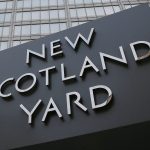An estimated 2.3 million people in the UK had COVID in the week up to 23 December – a substantial rise on the 1.4 million the previous week.
It is the highest number since comparable figures began in autumn 2020, the Office for National Statistics said.
In London, around one in 15 people was likely to test positive for COVID in the week to 23 December, the highest proportion for any region in England.
Infection rates increased across all four UK nations, with one in 25 in England – or around two million people – estimated to have had COVID.
The rate was one in 40 for Wales, Northern Ireland and Scotland.
England and Scotland’s rates are the highest since records began.
All figures are for people in private households.
COVID-19: ‘Significant increases’ in patients with coronavirus – as Northampton hospital suspends visitors
Ghislaine Maxwell ‘scapegoated’ for crimes of Jeffrey Epstein, claims her brother
Prince Andrew’s accuser Virginia Giuffre insists she is US resident and so lawsuit can continue
Separate data showed that the number of COVID patients in hospital in England had climbed to 11,452 on Thursday, the highest level since February 26.
Further figures revealed that 24,632 staff at NHS hospital trusts were ill with coronavirus or having to self-isolate on Boxing Day, up 31% from 18,829 a week earlier and nearly double the 12,508 at the start of the month.
Matthew Taylor, chief executive of the NHS Confederation, said the health service was facing a “perfect storm” of rising COVID hospital admissions and illness alongside increasing staff absences.
“The NHS is putting in plans to step up once again for patients with the new Nightingale surge hubs, extra support from community services and virtual wards, but there is no doubt the whole system is running hot,” he said.
“While the government seems determined not to increase restrictions in England, it is vital we all behave in ways that will not exacerbate an already dangerous situation.”
Professor Paul Hunter, an expert in infectious diseases at University of East Anglia, told Sky News that “a high peak now probably means that by the end of January we will be seeing relatively few cases compared to what we are seeing at the moment”.
He added: “So it’s a difficult choice: do we have the high peak of infections now and the pressure that that is undoubtedly bringing on the health service or do we try and suppress that but extend the duration that the NHS is under pressure as new cases arrive?
“We know any infectious disease that spreads really quickly reaches its peak very early, a high peak, and then generally falls quite rapidly at the other side.
“There is hope that it would peak and fall quickly. I don’t think it’s a forlorn hope. But certainly I don’t think we can guarantee that that would happen.”
Professor Hunter said that after the current peak the virus looked set to become an “endemic infection that will be here forever”.
“The issue though is that even if it is here forever it won’t necessarily be causing, and almost certainly won’t be causing, the severity of disease, the pressure on hospital beds, that we are seeing,” he added.






















